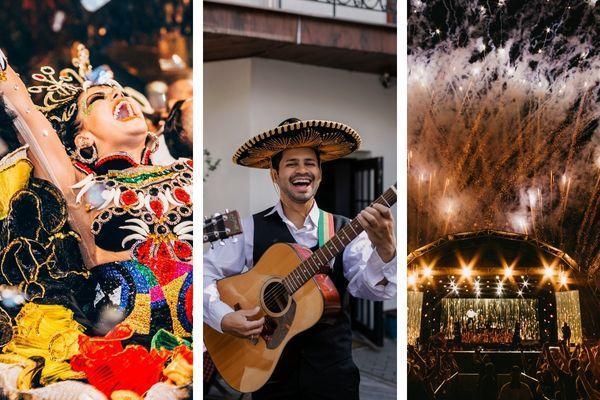Cultural festivals are the heartbeats of societies, offering a unique insight into the traditions, beliefs, and customs that shape communities. These celebrations often feature vibrant parades, traditional music and dance, elaborate costumes, and mouth-watering cuisine. Whether you’re a seasoned traveler or someone who enjoys learning about different cultures from afar, experiencing these festivals can be a life-changing adventure. Here are some cultural festivals you absolutely must experience at least once in your lifetime.
Rio Carnival, Brazil
History and Significance
The Rio Carnival, held in the vibrant city of Rio de Janeiro, is the world’s largest carnival, attracting millions of visitors every year. This spectacular festival dates back to the 18th century, originating from Portuguese settlers who introduced the tradition of celebrating before Lent.
Highlights
Samba Parades: The highlight of the carnival is the samba parades at the Sambadrome, where samba schools compete in elaborate and colorful performances.
Street Parties: Known as “blocos,” these street parties fill the city with music, dancing, and joyous celebrations.
Costumes and Masks: Participants don elaborate costumes and masks, adding to the festival’s vibrant atmosphere.
Diwali, India
History and Significance
Diwali, the Festival of Lights, is one of the most important Hindu festivals, symbolizing the victory of light over darkness and good over evil. Celebrated over five days, Diwali marks the return of Lord Rama to his kingdom after 14 years of exile, as narrated in the epic Ramayana.
Highlights
Lighting of Diyas: Homes and public spaces are adorned with oil lamps and candles, creating a mesmerizing glow.
Fireworks: Spectacular fireworks light up the sky, symbolizing the triumph of light.
Rangoli Designs: Intricate rangoli patterns made from colored powders and flowers decorate the entrances of homes.
Oktoberfest, Germany
History and Significance
Oktoberfest, held annually in Munich, is the world’s largest beer festival, dating back to 1810 when it was first celebrated to honor the marriage of Crown Prince Ludwig. This 16-18 day festival attracts millions of beer enthusiasts from around the globe.
Highlights
Beer Tents: Over 30 large beer tents serve a variety of German beers, each with its own unique atmosphere.
Traditional Music and Dance: Bavarian music and folk dances add to the festive ambiance.
Traditional Attire: Many attendees wear traditional Bavarian outfits, with men in lederhosen and women in dirndls.
Carnival of Venice, Italy
History and Significance
The Carnival of Venice, with its origins in the 12th century, is renowned for its elaborate masks and costumes. This festival is a time of opulence and mystery, celebrating the history and culture of Venice.
Highlights
Masquerade Balls: Elegant balls and parties, where guests wear intricate masks, are a key feature.
Grand Parade: A grand parade with costumed participants takes place in St. Mark’s Square.
Art and Theater: The festival includes various art exhibitions, theatrical performances, and concerts.
Chinese New Year, China
History and Significance
Chinese New Year, also known as the Spring Festival, is the most important traditional Chinese holiday, celebrating the beginning of the lunar new year. This festival, with a history of over 4,000 years, is steeped in customs and traditions.
Highlights
Lion and Dragon Dances: Performances designed to bring good fortune and chase away evil spirits.
Family Reunions: A time for families to come together, share meals, and celebrate.
Firecrackers and Red Decorations: Firecrackers are set off to ward off evil spirits, and red decorations symbolize prosperity and good luck.
Final Words

Experiencing cultural festivals around the world offers a unique opportunity to immerse oneself in the richness and diversity of human traditions. These festivals not only celebrate the heritage and customs of their respective cultures but also foster a sense of unity and joy among participants and spectators alike. Whether it’s dancing the samba in Rio, lighting diyas during Diwali, or sipping beer at Oktoberfest, each festival provides unforgettable memories and a deeper appreciation for the world’s cultural tapestry.
FAQs
1. What is the best time to visit Rio Carnival?
The Rio Carnival usually takes place in February or March, depending on when Easter falls. It’s best to plan your visit around these months to experience the full festivities.
2. How long does Diwali last?
Diwali is celebrated over five days, with each day having its own significance and rituals.
3. Is Oktoberfest family-friendly?
Yes, Oktoberfest offers a variety of family-friendly activities, including rides, games, and parades. There are also tents specifically designed for families.
4. Do I need a costume to participate in the Carnival of Venice?
While it’s not mandatory, wearing a costume and mask enhances the experience and allows you to fully participate in the festival’s spirit.
5. What are some traditional foods eaten during Chinese New Year?
Traditional foods include dumplings, spring rolls, fish, and glutinous rice cakes (nian gao), each symbolizing different aspects of prosperity and good fortune.













